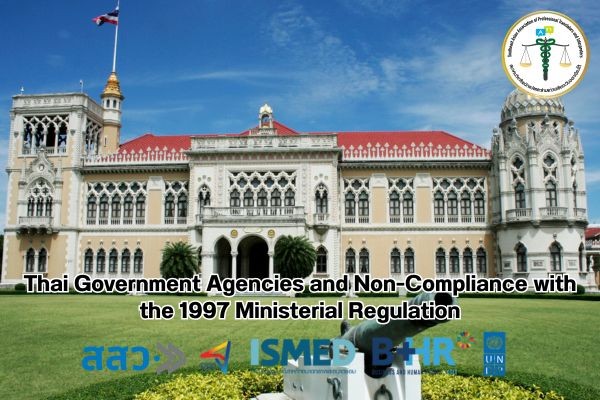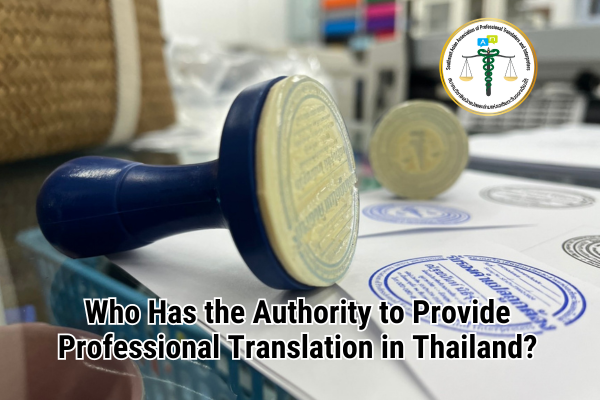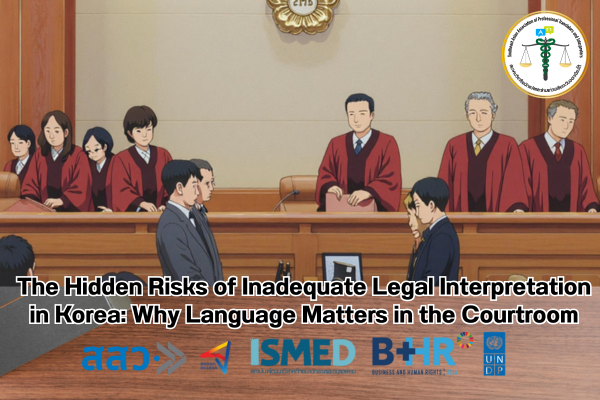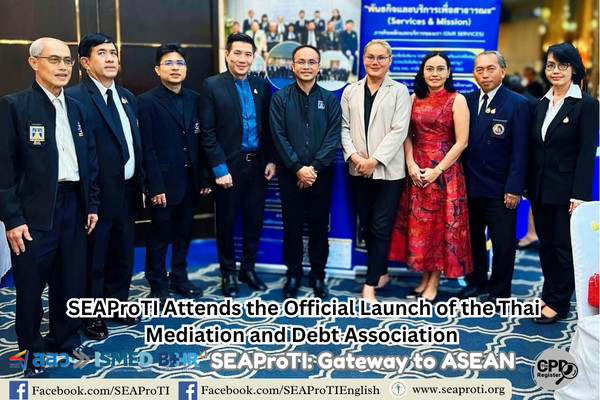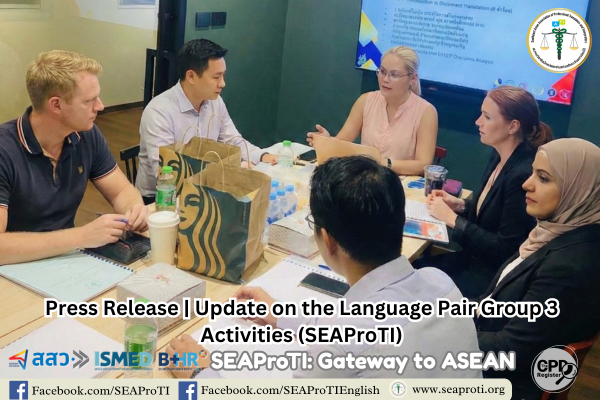Non-Compliance with the 1997 Ministerial Regulation under the 1996 Administrative Procedure Act: An Analysis of Causes and Policy Recommendations Concerning the Certification of Translated Foreign Documents in Thai Government Agencies
The 1997 Ministerial Regulation, enacted under the 1996 Administrative Procedure Act, sets out specific legal requirements for the certification of translated foreign-language documents used in administrative procedures. Despite the clarity of these regulations, many Thai government agencies continue to accept translations that do not meet the legal standards. This article examines the underlying causes of such non-compliance and proposes systemic policy recommendations to promote lawful and effective administrative practices, protect public rights, and ensure accountability in state procedures.
The Administrative Procedure Act B.E. 2539 (1996) governs how administrative decisions are made by state agencies under the executive branch, including ministries, departments, and special government units supervised by the Office of the Prime Minister. One of its key instruments, the 1997 Ministerial Regulation, mandates that any foreign-language document used in an official administrative process must be translated and certified by an authorized person as defined by law.
Failure to comply with this requirement can render administrative actions procedurally invalid and may lead to the loss of legal rights for citizens. However, a number of public agencies continue to accept uncertified or improperly certified translations in defiance of this regulation.
The Problem of Regulatory Non-Compliance in Practice
Although the legal framework is well-established, many government officials still accept documents translated by unauthorized individuals. This constitutes a serious procedural flaw that undermines legal certainty and administrative justice. In some cases, it may also give rise to disciplinary or even criminal liability.
Causes of Non-Compliance
Lack of Knowledge or Misunderstanding Among Government Officials
In many agencies, officials have not received adequate training or guidance regarding the legal requirements for translation certification. As a result, they may unknowingly accept translated documents from translators who are not legally authorized to certify such documents under the 1997 Ministerial Regulation.
Misinformation from External Actors
Some legal practitioners or freelance translators falsely present themselves as authorized certifiers and mislead government officials into accepting their translations. These individuals often do not meet the qualifications required by law, yet their misinformation creates confusion and procedural errors.
Conflicts of Interest and Mutual Benefits Between Public and Private Actors
In certain instances, collaborative projects involving both public officials and private entities—particularly those funded under a shared budget—create incentives for officials to overlook or bypass the legal requirements. Accepting uncertified translations becomes a matter of convenience or favoritism, at the expense of lawful process.
Policy Recommendations
To address these challenges, a multi-faceted policy response is needed:
- Develop and disseminate clear administrative guidelines across all agencies regarding who is legally authorized to certify translations, and under what conditions.
- Provide ongoing training for public officials, especially those involved in procurement, legal review, and project evaluation, to enhance understanding of the 1997 Ministerial Regulation.
- Establish and publicize a national registry of authorized translation certifiers, accessible through official websites and government portals.
- Implement internal audit mechanisms and disciplinary protocols to hold accountable any official who knowingly accepts unauthorized documents, potentially under Section 157 of the Criminal Code (malfeasance in office).
- Educate the public on how to properly prepare and certify translated documents for use in administrative procedures, to reduce unintentional errors and omissions.
Non-compliance with the 1997 Ministerial Regulation on the certification of translated documents reveals a critical systemic gap in the administrative capacity of Thai government agencies. Addressing this issue requires more than legal enforcement—it demands institutional reform, public service training, and transparency mechanisms that ensure proper adherence to the rule of law. By doing so, the state can protect citizens’ legal rights and improve trust in government processes.
SEAProTI’s certified translators, translation certification providers, and certified interpreters:
The Southeast Asian Association of Professional Translators and Interpreters (SEAProTI) has officially announced the criteria and qualifications for individuals to register as “Certified Translators,” “Translation Certification Providers,” and “Certified Interpreters” under the association’s regulations. These guidelines are detailed in Sections 9 and 10 of the Royal Thai Government Gazette, issued by the Secretariat of the Cabinet under the Office of the Prime Minister of the Kingdom of Thailand, dated July 25, 2024, Volume 141, Part 66 Ng, Page 100.
To read the full publication, visit the Royal Thai Government Gazette
การฝ่าฝืนกฎกระทรวง พ.ศ. 2540 ออกตามพระราชบัญญัติวิธีปฏิบัติราชการทางปกครอง พ.ศ. 2539:
การวิเคราะห์สาเหตุและแนวทางแก้ไขเชิงนโยบายเกี่ยวกับการรับรองการแปลเอกสารในหน่วยงานราชการ
กฎกระทรวง พ.ศ. 2540 ซึ่งออกตามพระราชบัญญัติวิธีปฏิบัติราชการทางปกครอง พ.ศ. 2539 ได้วางหลักเกณฑ์สำคัญเกี่ยวกับการแปลเอกสารภาษาต่างประเทศเป็นภาษาไทย โดยเฉพาะการรับรองความถูกต้องของการแปลเพื่อใช้ในกระบวนการทางปกครองของรัฐ อย่างไรก็ตาม ในทางปฏิบัติ พบว่าหน่วยงานราชการจำนวนไม่น้อยยังดำเนินการไม่สอดคล้องกับข้อกฎหมายดังกล่าว บทความนี้มีวัตถุประสงค์เพื่อวิเคราะห์สาเหตุหลักของการฝ่าฝืนกฎกระทรวงในประเด็นนี้ พร้อมเสนอแนวทางแก้ไขเชิงระบบเพื่อยกระดับความชอบด้วยกฎหมายและประสิทธิภาพในการบริการประชาชน
กฎกระทรวง พ.ศ. 2540 ซึ่งออกโดยอาศัยอำนาจตามพระราชบัญญัติดังกล่าว ได้ระบุไว้อย่างชัดเจนเกี่ยวกับ ผู้มีสิทธิเข้ารับรองการแปลเอกสารจากภาษาต่างประเทศเป็นภาษาไทย เพื่อใช้ในการดำเนินงานของรัฐ เช่น การพิจารณาโครงการ การยื่นคำขออนุญาต หรือการตรวจสอบข้อมูลทางกฎหมาย เอกสารที่ไม่ได้รับการรับรองการแปลอย่างถูกต้องจึงอาจเป็นเหตุให้การดำเนินการนั้นตกเป็นโมฆะหรือไม่ชอบด้วยกฎหมายได้
แม้กฎหมายจะมีความชัดเจนในเชิงหลักการ แต่ในทางปฏิบัติกลับพบว่าหน่วยงานของรัฐจำนวนมาก ละเลย หรือ ดำเนินการขัดต่อบทบัญญัติของกฎกระทรวง โดยเฉพาะการยอมรับเอกสารแปลที่ไม่ได้ผ่านการรับรองจากผู้ที่มีสิทธิตามกฎหมาย ซึ่งอาจนำไปสู่ปัญหาหลายประการ เช่น ความเสียหายต่อรัฐ การเสียสิทธิตามกฎหมายของประชาชน และการละเมิดหน้าที่ของเจ้าหน้าที่รัฐ
ความไม่รู้หรือความเข้าใจคลาดเคลื่อนของเจ้าหน้าที่รัฐ
เจ้าหน้าที่บางรายอาจ ขาดการอบรมหรือแนวปฏิบัติที่ชัดเจน เกี่ยวกับสถานะของผู้มีสิทธิรับรองการแปลตามกฎกระทรวง พ.ศ. 2540 ส่งผลให้มีการยอมรับเอกสารที่แปลโดยบุคคลทั่วไป หรือผู้ที่ไม่มีคุณสมบัติตามที่กฎหมายกำหนด
การได้รับข้อมูลผิดพลาดจากบุคคลภายนอก
หลายกรณีพบว่าเจ้าหน้าที่ได้รับข้อมูลที่คลาดเคลื่อนจากบุคคลภายนอก เช่น ทนายความหรือผู้แปลอิสระ ที่อ้างสิทธิในการรับรองเอกสาร ทั้งที่ตนเองไม่มีสถานะเป็น “ผู้รับรองการแปล” ตามกฎหมาย ส่งผลให้เกิดความเข้าใจผิดและความเสียหายในทางปฏิบัติ
ผลประโยชน์ต่างตอบแทนระหว่างภาครัฐและเอกชน
บางกรณีเกี่ยวข้องกับ ความสัมพันธ์หรือผลประโยชน์ร่วมกัน ระหว่างเจ้าหน้าที่รัฐและภาคเอกชน เช่น การดำเนินโครงการที่ใช้งบประมาณร่วมกัน ซึ่งนำไปสู่การละเว้นการตรวจสอบคุณสมบัติของผู้รับรองการแปล เพื่ออำนวยความสะดวกให้แก่คู่สัญญาโดยมิชอบ
แนวทางแก้ไขเชิงนโยบาย
เพื่อยกระดับการปฏิบัติตามกฎหมายและลดความเสี่ยงในการฝ่าฝืนกฎกระทรวง ควรมีการดำเนินการในระดับนโยบาย ดังนี้:
- กำหนดแนวปฏิบัติกลางสำหรับเจ้าหน้าที่รัฐทุกระดับ เกี่ยวกับการรับรองการแปลเอกสารภาษาต่างประเทศ พร้อมทั้งระบุรายชื่อผู้รับรองที่ได้รับอนุญาตอย่างชัดเจน
- จัดอบรมให้ความรู้แก่เจ้าหน้าที่รัฐอย่างต่อเนื่อง โดยเฉพาะผู้มีหน้าที่พิจารณาเอกสาร เช่น เจ้าหน้าที่พัสดุ กฎหมาย และเจ้าหน้าที่โครงการ
- เผยแพร่ข้อมูลต่อสาธารณะ ผ่านเว็บไซต์ของหน่วยงาน ว่าเอกสารใดต้องมีการรับรองการแปล และผู้ใดสามารถรับรองได้บ้าง
- วางกลไกตรวจสอบภายในและลงโทษทางวินัย ต่อเจ้าหน้าที่ที่ละเลยหรือปฏิบัติหน้าที่โดยมิชอบตามมาตรา 157 แห่งประมวลกฎหมายอาญา
บทสรุป
การฝ่าฝืนกฎกระทรวง พ.ศ. 2540 ในประเด็นการรับรองการแปลเอกสารต่างประเทศ ถือเป็นประเด็นสำคัญที่สะท้อนถึงช่องว่างเชิงระบบของราชการไทย การแก้ไขปัญหาดังกล่าวไม่อาจกระทำได้ด้วยมาตรการทางกฎหมายเพียงอย่างเดียว แต่ต้องดำเนินควบคู่กับการพัฒนากลไกบริหารจัดการ ความรู้ของเจ้าหน้าที่ และการสร้างวัฒนธรรมความรับผิดชอบในกระบวนการทางปกครอง จึงจะนำไปสู่การบริการสาธารณะที่ถูกต้อง เป็นธรรม และโปร่งใสตามหลักนิติธรรมอย่างแท้จริง
เกี่ยวกับนักแปลรับรอง ผู้รับรองการแปล และล่ามรับรองของสมาคมวิชาชีพนักแปลและล่ามแห่งเอเชียตะวันออกเฉียงใต้
สมาคมวิชาชีพนักแปลและล่ามแห่งเอเชียตะวันออกเฉียงใต้ (SEAProTI) ได้ประกาศหลักเกณฑ์และคุณสมบัติผู้ที่ขึ้นทะเบียนเป็น “นักแปลรับรอง (Certified Translators) และผู้รับรองการแปล (Translation Certification Providers) และล่ามรับรอง (Certified Interpreters)” ของสมาคม หมวดที่ 9 และหมวดที่ 10 ในราชกิจจานุเบกษา ของสำนักเลขาธิการคณะรัฐมนตรี ในสำนักนายกรัฐมนตรี แห่งราชอาณาจักรไทย ลงวันที่ 25 ก.ค. 2567 เล่มที่ 141 ตอนที่ 66 ง หน้า 100 อ่านฉบับเต็มได้ที่: นักแปลรับรอง ผู้รับรองการแปล และล่ามรับรอง


